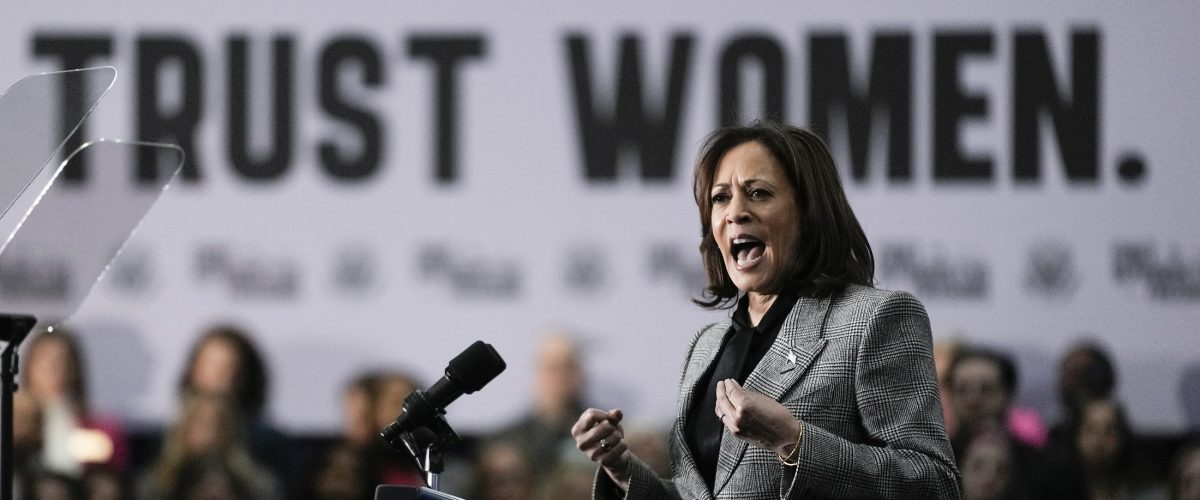While it is nothing new, the last few weeks have marked a whole other chapter in ways for us to guard ourselves against racism and sexism in this country.
With Kamala Harris now the presidential nominee for the Democratic Party, this historic, breathtaking moment was immediately met with a slew of disgusting comments about her.
“What the hell has Kamala Harris done other than collect a check?”
“She’s a DEI hire.”
“She only got into politics by sleeping her way to the top.”
“She’s not fit to be president because she doesn’t have children.”

Brianna Childs
With every comment I read, the angrier I become. And the more reason I have to speak out about the way we speak about Black women in this country.
As a white woman, I find myself responding to the call from Black women all around me: We’re tired. Could you do the work alongside us?
That is what I hope to do, to fulfill a responsibility that has been mine for a long time as a pastor, licensed social worker and friend. And as a white person who knows my responsibility to hold other white people accountable, too. And all of it wrapped up in a responsibility to advocacy, empathy and education.
Each of the comments above comes with its own special kind of sexism and racism, honestly.
The “collecting a check” comment automatically is associated with racist views of Black mothers on welfare, a deeply ingrained perspective held by those in the United States. Welfare is an important fabric of our country, available to any who meet the requirements for it.
The majority of U.S. welfare recipients are white, not Black. As a people group, there is a higher incidence of using welfare among Black people than among whites or Hispanics, but that traces back to the long, racist history of slavery, which turned into Reconstruction laws that kept Black people exploited and used as a labor source, which turned into Jim Crow, which turned into the GI Bill, which turned into redlining and racial covenants, which turned into mass incarceration and police brutality.
All these things build and build, and all of them contribute to the microaggressions and macroaggressions we still witness every day. We still seek equity for all, and we still have a long way to go.
The comment about how Harris entered politics by sleeping with someone — this is despicable. On one hand, the claims are belittling and do nothing but further objectify and discount her. This uses a gross, old trope that tries to take away the hard work women do to get where they are in jobs.
“This claim about Harris is steeped in lies and sexism, and we should call it as it is.”
Second, comments like this always forget the other side of the equation. The other side means men withhold opportunities from women if sex is not involved. It means men abuse their power, even wield it as a weapon, to demand sex in exchange for those opportunities.
This is what we should constantly be calling out in every workplace environment. This claim about Harris is steeped in lies and sexism, and we should call it as it is.
The comments about Harris not being a mom are appalling on multiple levels. To start with, she is a mom. Her stepchildren and even her husband’s ex-wife have been vocal about how important she has been to their lives and how she has co-parented beautifully.
To negate motherhood in all forms except biological is dangerous, mean and downright traumatizing to millions of women in our country and throughout the world.
On another level, womanhood and our very dignity as human beings is not tied to motherhood. All of us who have not borne children are just as sacred, important and, without question, fit for our jobs, regardless of having biological children.
Women’s voices matter, and our worth never has been and never will be tied up in being biological mothers.
As someone who is childfree myself, this discussion around how only parents are fit to be leaders has been discouraging, to say the least. I have seen this messaging in churches all the time — the ideal pastor is a married man with children.
But I have done far too much work to unlearn all this messaging around women in leadership in the church to let these comments gain traction. I have done far too much work unlearning the messaging around what it means to be a “good” woman. I have done all kinds of work unlearning the messaging that my ultimate calling is to be a mother and until then I won’t really be fulfilled.
“I am worthy as I am, whether I ever have children or not.”
In its place, I have learned the world is so much bigger, leadership is for women, and I am worthy as I am, whether I ever have children or not. Rather than validating any of the other messaging, let’s encourage these things instead.
And maybe you’re reading all this as a white person and thinking, “Yeah, I know this.” One, thanks for doing the work. And two, the work never ends as white people.
Although these examples of comments are overt, there are microaggressions, defined as “the everyday, subtle, intentional — and oftentimes unintentional — interactions or behaviors that communicate some sort of bias toward historically marginalized groups” that are just as important to watch. Like commenting on people’s hair, or noting how smart and articulate she is, or the heightened and meticulous criticism of her because she is a woman.
In all these things, I invite you to refrain from perpetuating lies. Even more, I invite you to call people out when they say comments like this that are racist and sexist, from aggressions to macroaggressions. Even if they are intended only to discuss Kamala Harris, isn’t she a human too?
Much more, Harris probably never will see the comment, but women and Black women in particular around you will. The words we say and the words we write on the Internet have the power to encourage and heal or the power to perpetuate centuries of racist and sexist trauma.
There may be moments you do not agree with all of Vice President Harris’ politics, but that should not mean you deviate into racism and sexism.
“If all this makes you feel defensive, then I invite you to take a deep breath and consider why it does.”
If you’re not sure what that looks like, then I invite you to do the work. Black women are tired of educating us on how all this impacts them. I invite you to seek out resources that are freely available and learn the impacts of racism and sexism. Learn why life is so tiring for Black women every day. Learn why these comments all carry a weight so much greater than the sum of the words.
If all this makes you feel defensive, then I invite you to take a deep breath and consider why it does. Listen, and turn toward empathy and compassion.
If you need resources, here are some books to read, people to follow and websites to peruse:
- American Civil Liberties Union
- Brown Faces White Spaces, by Latasha Morrison
- The Very Good Gospel, by Lisa Sharon Harper
- I’m Still Here: Black Dignity in a World Made for Whiteness, by Austin Channing Brown
- This Here Flesh, by Cole Arthur Riley, @blackliturgies
- The Color of Compromise, by Jemar Tisby
- How to Fight Racism: Courageous Christianity and the Journey Toward Racial Justice, by Jemar Tisby
- How to be an Antiracist, by Ibram X. Kendi
- The Making of Biblical Womanhood, by Beth Allison Barr
Brianna Childs serves as executive pastor of Gather Houston. Last year, she completed a pastoral residency at Wilshire Baptist Church in Dallas. She earned a master of divinity degree from George W. Truett Theological Seminary and a master of social work degree from the Diana R. Garland School of Social Work at Baylor University. She loves to spend time exploring with her husband, Blake, and their dog, Diggory.
Related articles:
Racism’s absurdity in light of the gospel
Christians are preventing America from confession and repentance of racism
Woke, awake or unfaithful? Racism in the white church
Misogyny is in your church too
Let’s stop treating the dignity of women as a secondary issue good Christians can disagree on
Pastors, will you speak up when a Black woman is demeaned?


